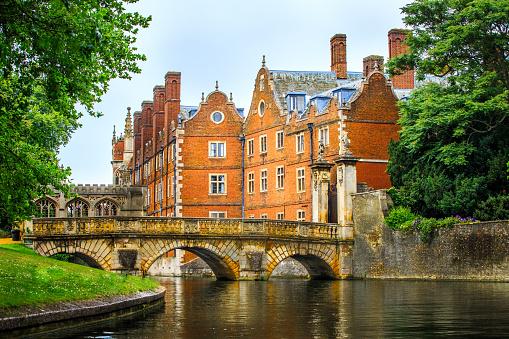
Oxford vs Cambridge: How to Choose the Right University
So, you have decided that you are going to apply to Oxbridge... but how do you decide whether to apply to Oxford or Cambridge University?
Many people do not know that you cannot apply to both for an undergraduate degree; you have to decide between them.
When it comes to choosing between Oxford vs Cambridge, it can be difficult to know where to start. Our University Admissions Consultants have therefore compiled the following similarities and differences in order to help make this decision a little easier for you...
Similarities between Oxford and Cambridge University
The two cities and universities within them do have a lot in common. Here are some important similarities:
1. Teaching style
Both Oxford and Cambridge have a similar teaching style in that they teach in very small group sessions of usually between 1 and 4 students to one tutor.
Although they have different names (Oxford call them “tutorials” whilst Cambridge call them “supervisions”), they are one and the same and provide a very individualised style of learning.
This is the teaching style that sets Oxbridge apart from the lecture and larger seminar structure of many other universities.
2. Collegiate structure
Both Oxford and Cambridge have a collegiate structure, meaning they are made up of a large number of constituent colleges. Each college has its own admissions process, and seminars will be organised by the college, whilst all lectures will be held centrally.
When applying to Oxford or Cambridge you will typically choose to read at a specific college based on your academic interests. However, if you can't decide which one to choose, you can submit an open application!
A good way to choose a college is to narrow it down to a few favourites from researching them online, and then going to visit and seeing if you feel at home there!
3. Traditions
It will not come as a surprise from the first and second oldest Universities in England, Oxford and Cambridge respectively, that both universities are steeped in tradition.
Starting your time at either will see you donning an undergraduate gown for your matriculation (the formal ceremony that admits you to the college), attending Formal Hall, and (if you are at Oxford) even wearing your gown for exams. This can be a little strange to get used to at first, but you soon get used to it.
As you can see, Oxford and Cambridge are not worlds apart. However, there are some important differences worth taking into account in your considerations, particularly when it comes to their academic aspects.
Key Differences: Oxford vs Cambridge
1. Size and atmosphere of the city
The cities themselves both feel very different to each other. Cambridge, particularly central Cambridge where most of the University facilities can be found, is quite small and has a slower pace of life than Oxford.
Oxford feels more like a city with a university in it, as opposed to Cambridge where it can sometimes feel like a university with the rest of the city filling in the gaps! Spending a bit of time in both cities will help you figure out which suits you best.
2. Subject options
There are some differences in subject choice across Oxford and Cambridge. For example, Cambridge offers Natural Sciences in which students can specialise in either physical or biological sciences, whilst Oxford has separate science courses such as Chemistry, Physics and Biological Sciences.
Similarly, Cambridge offers Human, Social and Political Sciences (HSPS) whilst the closest equivalent in Oxford is Philosophy, Politics and Economics (PPE). It is important to look at the course content and see what suits your interests most.
3. League table rankings
Oxford and Cambridge are consistently in competition for the top spot nationally in university league tables, however, it is worth looking at league tables for your specific subject, and also check which metrics the league table is using.
For example, if you are particularly interested in pursuing further research in your subject, check to see if the league table you are using takes into account international research.
The most important consideration is that you feel comfortable in the city that you will call home for three or more years!
It is definitely worth visiting both Oxford and Cambridge University, either on an official open day, through a summer course, or just individually when you have the time to spend the day exploring and really getting the sense of the cities and universities.
Hopefully the above helps to make things easier for you when choosing between Oxford and Cambridge.
Let Our Consultants Guide Your Oxford vs Cambridge Journey
If you would like any further advice from our Oxbridge applications experts here at William Clarence, or you’d like to enlist their support to increase your chances of winning a place at Oxford or Cambridge University, please do not hesitate to contact us today! Our consultants can guide you through every stage of your application.
About the author/Education Consultant
Zoe Tyndall runs Oxbridge International Summer School, a company that specialises in providing a full live-in experience for a portion of the summer holidays for students around the world.
Frequently Asked Questions
What is better, Cambridge or Oxford?
There’s no one-size-fits-all answer to which is better. Choosing between Oxford and Cambridge depends on what “better” means for you.
Some find Cambridge suits them more if they prefer a slightly more relaxed city atmosphere with strong strengths in sciences and interdisciplinary courses; others prefer Oxford for its breadth of course offerings, tutorial style, or specific strengths in certain humanities.
At William Clarence, we assess your interests, learning style, and goals to help you decide which university will likely offer you the best fit.
Which university is harder to get into, Cambridge or Oxford?
Both Oxford and Cambridge are extremely competitive. Neither is strictly always harder than the other. It often comes down to the subject you’re applying for.
Some courses at Cambridge might have fewer places (making them more selective), while some courses at Oxford might require more intense or specific entrance tests or interviews.
At William Clarence, our Oxbridge specialists can help you understand where each university is more competitive for your chosen subject and guide you on how to make your application as strong as possible.
Which is more expensive, Oxford or Cambridge?
Tuition fees are broadly similar for both Oxford and Cambridge, especially for UK students. Differences tend to come in living costs such as accommodation, food and travel. This depends on the college, your lifestyle, and whether you’re local or an international student.
Neither is universally more expensive than the other, though some colleges or courses might incur higher costs. William Clarence can help you estimate the full costs (visa, travel, college fees, living costs) so you can plan properly.
Do Oxford and Cambridge have a rivalry?
Yes, there is a long-standing, friendly rivalry between Oxford vs Cambridge. It shows up in academic comparisons (league tables, research output), in sports (like the famous Boat Race), in traditions, and in comparing student experience. But at its heart, it’s a constructive rivalry: it pushes both universities to maintain high standards.
In our work at William Clarence, we help students understand what each institution offers in headline prestige and in daily student life so you can choose based on where you’ll thrive, not just reputation.

